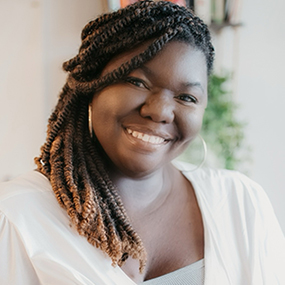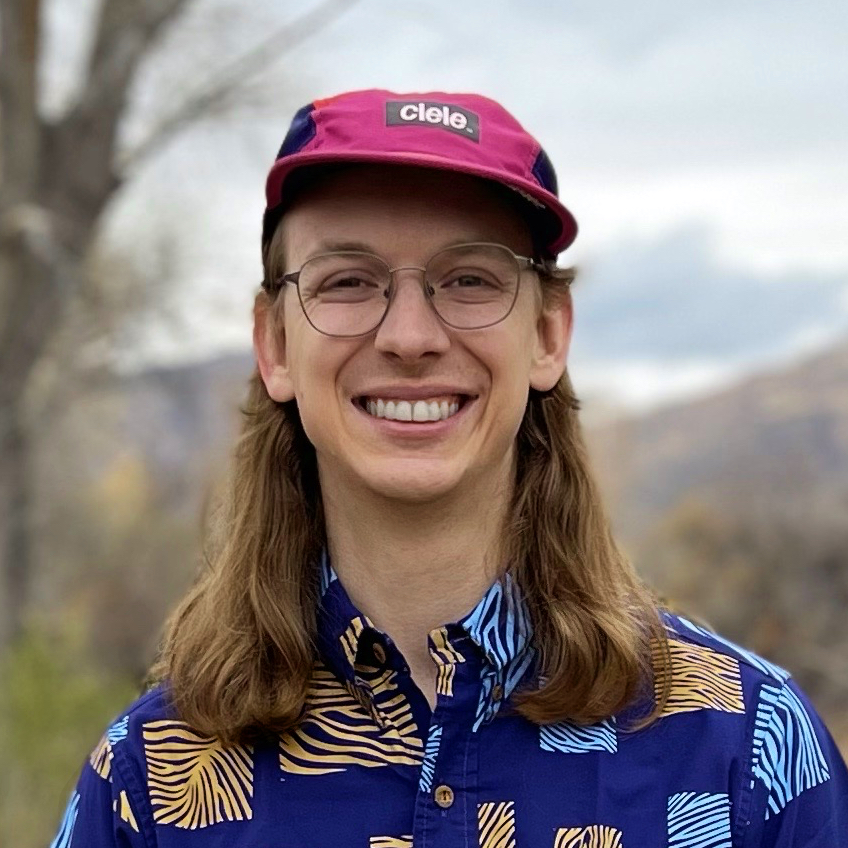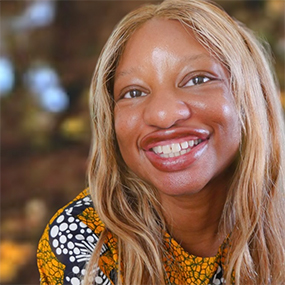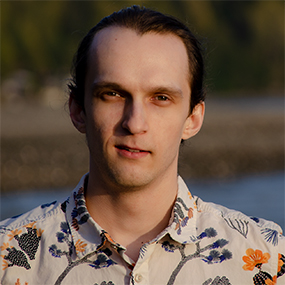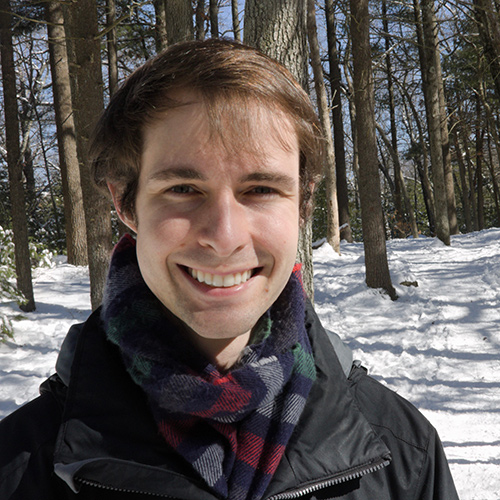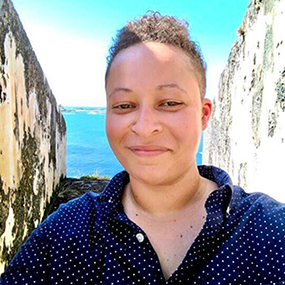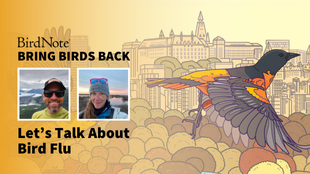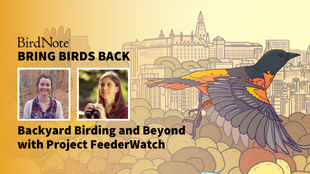

Join BirdNote tomorrow, November 30th!
Illustrator David Sibley and actor H. Jon Benjamin will face off in the bird illustration battle of the century during BirdNote's Year-end Celebration and Auction!

This episode’s guest may be too young to remember the 90’s children’s show, Gullah Gullah Island, but he’s certainly influencing the next generation the same! Isaiah Scott, a rising Gen-Z bird-influencer and ornithologist, reconnects with Tenijah to dish all about his journey into birding while young, Black and curious. He also shares how his Gullah Geechee heritage continues to inspire his work, including a forthcoming field guide that seeks to preserve his ancestral connection to birds. There’s definitely “lots to see and to do there”– press play and take the journey with us!
Want more Bring Birds Back? Follow us on Instagram! For more BirdNote, subscribe to our weekly newsletter. For ad-free listening and other perks, sign up for BirdNote+ here.
BirdNote is a nonprofit. Your tax-deductible gift makes these shows possible.
Bring Birds Back Season 4 is sponsored by the Cornell Lab of Ornithology.
[Bring Birds Back Stinger]
[Jazzy Lounge Music Starts]
Tenijah Hamilton: From BirdNote, this is Bring Birds Back. I’m Tenijah Hamilton.
Picture me on a boat. With a lot of people — a whole gaggle of birders, specifically Black birders. There are tons of binoculars, telescopes with enough power to count moon craters, long lens cameras, phones, field guides and lots of feelings: and chief among them is joy. Joy and nerves… I’m a little nervous. It’s my first birding trip and we’re in coastal Georgia — and though I’m surrounded by peers and friends, I couldn’t help but think, “What am I doing here? I’m a pandemic birder — a newbie — and there are folks here who have been doing this longer than I’ve been alive!”
But as soon as I had that self-defeating thought, I met someone who turned the whole thing on its head: my guest today, Isaiah Scott. Isaiah is kind of… sunshine in a person. When we met last year, my first glimpse of him was on this boat, GoPro in hand, giving an environmental breakdown of the landscape while talking to folks on camera. Instantly, I’m dazzled. I go to meet him, and I find out he is nineteen, a sophomore in college, and a whole Instagram bird-influencer. His account “Ike’s Birding Hikes” has over 100,000 followers!
Isaiah is another rising Gen Z star who’s taking the conservation world by storm, responding to the threats of global climate change and taking the reins. Along with trailblazing activists like Greta Thunberg and Leah Namugerwa, so many young folks are connecting deeply with our planet, sharing their love with others, and fighting to protect nature. Isaiah’s motto is “Explore, Observe, Learn.” And to start our interview, I wanted to dig into how that guides him.
Isaiah Scott: It started with Ike’s Birding Hikes. Kind of, like my motto when I first was starting to lead hikes and to share, just, these beautiful bird watching experiences with people in my community around the Savannah area. Going to different places in nature, even in your backyard. And then observing, like what do you see when you're visiting these places in nature? But not only just birds, you can observe other wildlife. You know, if you see a deer or reptiles, amphibians, insects, plants as well.
And then learn is the takeaway from that whole experience. You know, like, what have I learned by exploring this place and observing these things I've been seeing? And I just feel like that whole kind of process is a framework that can set-up to have just a better understanding and a better appreciation, and just a way to connect yourself to nature.
Tenijah Hamilton: That's really powerful. And it, um, reminds me of another kind of tagline for people who are hikers when they say: “Leave nothing but your footprints, take nothing but your memories.” Because I think a lot of people have an extractive relationship with nature where they wanna go and they wanna touch and pick and disturb.
And what I like about “Explore, Observe and Learn” is the idea that it really feels like you're there to be in it. And then to kind of leave with your knowledge, which I think is so important. And I love that that's your tagline.
Isaiah Scott: Yes. Yeah.
Tenijah Hamilton: Let's take a couple of quick steps back because I wanna know, how did you even get into birding? Again, I wanna stress that you are young. You're a sophomore in college. To my knowledge, there aren't that many avid sophomore-in-college birders. But what do you study in school? What's your major?
Isaiah Scott: So, my major is Environment and Sustainability, working to do a student-designed concentration called evolutionary biology and ecology. Uh, so currently that's what I'm studying here at Cornell.
Tenijah Hamilton: Full disclosure — Cornell Lab of Ornithology is a sponsor of the podcast this season but they had no influence or involvement with the creation of this episode. OK, back to the show.
Tenijah Hamilton: I would love to know how you got here. What was your bird journey? What inspired you? Just give us a sense.
Isaiah Scott: It first started with a broad interest in my love for the outdoors and nature and animals. I love lizards and um, turtles and frogs and being outside and going to the beach.
And I also love nature books and animal books.
Tenijah Hamilton: You were that kid.
Isaiah Scott: Yeah, I was that kid. Yeah. The, the, the young Steve Irwin. You know, kind of— I was kind of like in that—
Tenijah Hamilton: I love that.
Isaiah Scott: And I have a older brother, his name is Darius, and he got admitted to Cornell. And so, he recently just graduated. I was like 15 years old at the time. He had his college visit to Cornell. And so me and my family went with him and while we were there I saw this flier for the Cornell Lab of Ornithology.
And so while we're there, we went to visit. And I was just really just blown away and inspired by the whole place. Specifically they have this, um, beautiful, huge mural with these colorful birds. And the artist who painted it, I believe her name was Jane Kim. What the mural depicted was, it was like the map of the world, but it showed all of the birds and like where they're found. Like all different types of birds.
And it really just showed me, I was like, wow, I didn't know there was this many birds and how there's birds with different colors and different sizes and bill morphologies and it just made me recognize the beautiful diversity of birds all around the world. And so from that point I was like, I wanna know more about birds.
Like, you know, I wanna go out and see what birds that I find and how many of these birds on this wall that I could potentially see one day. And so I got my first small pair of binoculars from the gift shop there at the Cornell Lab of Ornithology.
I also got a field guide as well, and went out, started bird watching. Ever since then, I just been pointing my eyes towards the skies with my binoculars and, yeah.
Tenijah Hamilton: Thinking back to 15-year-old Isaiah and okay, you're sparked. You're like, "okay, birds are kind of cool. I'm kind of into it". There was something else that you did that really kind of pushed you down this road, and so I'm wondering if you could tell me about Ike's Birding Hikes.
Isaiah Scott: Yeah. So Ike's Birding Hikes.
Tenijah Hamilton: Very clever, by the way.
Isaiah Scott: Oh, thank you, yeah. So I'll also, I'll also talk about the origin of that name, where that came from. So this was going back when I was in middle school. I was a part of this organization called 4-H. It was like a presentation contest, speech contest called DPA. Or it was District Project Achievement.
I talked about this bird called the American White Ibis, and it's one of my favorite birds.
I got third place or second place. But I wanted to be first. And, um, my mom, who was my biggest mentor in my life and has—
Tenijah Hamilton: Can I pause and say, shout out to your mom? 'Cause I met your mom when we were on Little St. Simons and she rides for you. I love it. It's so beautiful to see. So, hey Mama.
Isaiah Scott: Love you, Ma. She told me about — well, what if you make the presentation like a mock bird walk. She told me, like, what if the name could be ‘Ike’s Birding Hikes?’ So, I feel like this would be embarrassing. Like this silly name and people will laugh.
But I ended up doing it and, like, adding that part to really make it more engaging for the audience. And so somewhere down the line, I wanted to just share about bird watching with other people. And so, from there I started leading hikes. I had some very supportive agricultural education teachers at my high school. And they were in charge of these acres of farmland, called the Honey Ridge Agricenter.
From there I connected with them and, yeah, we went out and set up and had my first Ike’s Birding Hike. And there was also, um— a local news reporter came out as well and I was in the paper for it. The president of the Ogeechee Audubon, which is a local Audubon society, her name was Leslie and she made me a honorary member of the club. And she came out and also some of the other Audubon members came.
And, um, just one thing to another, so that's where Ike’s Birding Hikes came from.
Tenijah Hamilton: So it's really interesting because we're in season four of Bring Birds Back, and we're starting to see this phenomena that I think is super cool, which is that Gen Z is really doing conservation differently. Um, last season, we got to talk to Maya Higa, who runs a Twitch stream, kind of at a sanctuary that she has for animals. But there's you and you are absolutely a birding influencer. And a lot of people are so invested in seeing the moves you're making and the things you're doing. Can you talk to me about what it's like being a part of Gen Z and kind of changing the way that conservation is done?
Isaiah Scott: With Ike’s Birding Hikes and the whole Gen Z movement of wildlife conservation and environmentalism on social media and all these different platforms, my goal with Ike’s Birding Hikes is to really just make nature education and bird information just really enjoyable and fun and relatable and accessible to other people. And especially the youth, just — how can I connect and get more young people outdoors and in nature?
It's just a beautiful movement that really shows how a lot of young people are just starting to care and there's so many, you know, ologists,
Tenijah Hamilton: So many ologists.
Isaiah Scott: All these, yeah, professions, um, for the future. And I really think it's just a very exciting movement and just very vital to continue the work of conserving, protecting and just educating about the natural world.
[Music Transition]
Tenijah Hamilton: My favorite part about Isaiah's story is that it’s very relatable. Like many Gen Zers, he had a difficult time at the start of the coronavirus pandemic. And that led him to questioning his future plans at his dream school.
Isaiah Scott: I was kind of limiting myself, kind of discouraged myself. I was like, well, maybe, Cornell wasn't for me in the first place. I already had Clemson University on my mind—and that's where Dr. J. Drew Lanham works at.
Tenijah Hamilton: Ike's Birding Hikes ended up being more than just a refuge for him during a challenging time.
Isaiah Scott: I received an email from a PhD student from Cornell named Ethan Duvall. And he reached out to me because he noticed my Instagram on Ike’s Birding Hikes.
Tenijah Hamilton: Duvall eventually connected Isaiah with Irby Lovette, a Director at the Cornell Lab of Ornithology. Lovette ultimately encouraged Isaiah to apply, despite Isaiah's reservations. And now, Isaiah's not only a star student on campus — and on social media — he's also served as the head of Diversity, Equity and Inclusion at Cornell's Birding Club. So, what does it mean to be a young, Black student in a field typically run by older, white men? And what does that feel like?
Isaiah Scott: Yeah. So, I guess my experience here, kind of just overall speaking, I’m like one of the very few Black birders here at Cornell. You know, everyone is of course very welcoming and very friendly. 'Cause there are also just lots of birders here.
But sometimes it can feel like you're a little isolated or not seen and I have, like, experienced microaggressions or just subtle things, especially going out in birding groups and I'm the only person of color.
But by just kind of finding and connecting with other Black and people of color here at Cornell who are also just into birding, just to kind of have more of just a sense of community, and just not that feeling that you're really alone in this space.
I didn't mention this about my first experience at the Cornell Lab of Ornithology. When I first went there, one thing that my mom pointed out to me as we were walking down the halls: it was these rows of professors and ornithologists and conservationists and like scientists who've worked and done research in the lab.
And Mom said, "Take a look at this wall and notice how none of them look like you.” And so, for me, someone who didn't see themselves, you know, on the walls and for me now to, five years later, be at the lab and a sophomore currently pursuing to one day have a picture of me on that wall. And so it would be an inspiration and a representation for the next young Black child that walks past that wall. I guess I'm working towards that.
And last semester I had a professor, a Black woman, named Monique Pipkin, and she studied iridescence in bird plumages. There's also another bird researcher who is also a Black woman named Amelia-Juliette [Claire Demery]. And so it's just really so comforting just to see yourself in these spaces and just seeing how they're paving a way for people like me.
But I think it's just really so important for me to be here to be an inspiration and to show other people "Hey, we're out here birding too. You know, we study birds at the Cornell Lab of Ornithology".
[Music transition]
Tenijah Hamilton: After the break, we’re talking about conservation in the Gullah Geechee Heritage Corridor. Stick around.
[Music fades]
[Midroll]
Tenijah Hamilton: When we met in October; and again, we were in coastal Georgia and we talked about that a lot. I know one of the things is I recommended this movie to you, Daughters of the Dust, directed by Julie Dash. It really tells the story of the Gullah Geechee people and it's beautiful. And so I know that you have a very particular relationship with the natural world and specifically that kind of coastal region. Can you tell me about that?
Isaiah Scott: Yeah. So, my heritage is Gullah Geechee. And after I got into birding, I kind of learned about and was just very interested in just learning more about my heritage and culture, history.
Tenijah Hamilton: And can you just give us a primer of who the Gullah Geechee people are and their imprint on that part of the world?
[Music Transition]
Isaiah Scott: Oh, yes, yes. So, Gullah Geechee are descendants of enslaved Africans who reside on the coast of North Carolina, South Carolina, Georgia, and northern Florida. And so that whole region is known as the Gullah Geechee Heritage Corridor. And they essentially created their own cultures on the Sea Islands and in the swamps and forests of these areas.
And a lot of their traditions and practices were carried over from West Africa. So they're able to hold on to their ancestry and honor their West African roots, even through the horrendous times of enslavement. And so, one way that they're able to do this was, you know, connecting with the natural environment around them, with the wildlife and the plants and the water. There's just a very intimate connection with Gullah Geechee people and the natural world of the southeast coast.
And to my next point or opportunity that I'm working on. Well, in 2021, I received the Eckelberry Fellowship, which endows nature artists and illustrators, which is also one of my passions. So illustrators and artists get endowed to develop a publication or write a book. And so my project that I'm working on is a field guide of birds of the Gullah Geechee culture. And so I've been doing research and found a lot of birds in their culture and how many feelings of life and death and freedom and beauty are expressed through birds. And not only in, like, folklore, but just birds that they would see, like, day to day; birds that they would hunt and kind of lived off of to survive.
And so really this whole guide is just: what birds was a symbolic way of freedom and liberation for Gullah Geechee people.
So that's what the book is about. And it's mostly gonna be illustrations. So it's currently in development, so I'm really, really excited to be working on it and to share, like, an untold story. Something that's not really been explored about in, especially in like the field of ornithology and in bird books. So, really excited.
Tenijah Hamilton: I think that's incredible and I'm so excited for that. My family also comes from that region and these aren't things that we learned about in school and these aren't things that we were really taught. And hearing you talk about folklore and folk stories and stuff is really powerful too, because so much of our history is intertwined in that oral word of mouth, and then linking it with birds and the natural world is gonna be so cool.
[Music fades]
Before we get off the topic of Gullah Geechee folks and how important it is for you to carry on that legacy, I know that you are raising some funds for some land preservation in honor of your ancestors. So can you tell me a little bit about that and what you're trying to do?
Isaiah Scott: So another project that I also have going on is I'm raising funds to have a nature preserve. Not only just a nature preserve but a cultural heritage preserve. The whole, like, idea where that came from was just the thought of, you know, ‘what if I had Ike’s Birding Hikes and lead hikes on my own tract of land?’
And so I've always had this dream of owning, like, a nature preserve or protecting a habitat or forest, and being able to make it accessible to people, and have people come out and learn about nature, and for wildlife education.
But, also, I had an interest to preserving and protecting land that is significant to my heritage: Gullah Geechee people. Recently, a lot of Gullah Geechee land or land that was once owned by Gullah Geechee settlements and areas where they lived and resided and lived off the land have been taken over and gentrified. And also I know there's a lot of property and homes have also been taken away, as well, from Gullah Geechee people.
And so we're seeing Gullah Geechee culture dwindle. And so I also wanted to do something about that as well and have land that can be used and have my people live off of it, and harvest the grass for sweetgrass baskets, and other forms of recreation. So that’s also one of my goals as well with the nature preserve.
Tenijah Hamilton: And how much money are you looking to raise?
Isaiah Scott: So my current goal is $100,000. And so far I've raised a little over $4,000. I have a GoFundMe in my link in bio. I'm really just seeing this as a long-term goal to hopefully, one day, have a nature preserve for nature and culture. So, yeah.
Tenijah Hamilton: I'm a big believer in putting your requests out into the world and the universe and letting it provide for you. So, you heard Ike — you know where to go to find that GoFundMe and let's get that gap closed.
Isaiah Scott: Yes.
Tenijah Hamilton: I, for one, cannot wait to see everything that happens with it. And I wonder if you know how much you being out in the world and doing what you do and what your platform will inspire the next young person whose friends were like, "Oh, you're lame for liking birds.” Like, I think you helped change that association with what a birder looks like. And I'm wondering if you have advice for that young person who thinks that the world of birding, maybe, is daunting. And you know, if they don't know where they fit in, what would you tell them?
Isaiah Scott: Yeah. I would tell that young person to first go out and try birding for yourself whether it just be your backyard or even birding through a window. And, you know, during the first time, you don't always have to know what species it is or know how to identify them or how to identify the calls. It can just be just for pure enjoyment of, ‘Oh, there's a bird.’ And like, if you enjoy birding from that first experience, then keep going with it. Because there's just a world of opportunities and so many — just joy and life that you'll just get out of bird watching.
Tenijah Hamilton: The moment you said ‘joy,’ I was like: that's it. I was like, that's really what it's all about. And that's what I'm hearing you kind of describe. The joy of the experience, rather than ticking off a list, which I think a lot of people can get bogged down by. But you have it exactly right. Making sure you, kind of, capture the joy.
This has been such a lovely conversation. And before we sign off, we’ve got this new segment called Bird Association — I’m gonna ask you a couple real quick, like rapid fire questions and you tell me what comes to you. Does that sound good?
Isaiah Scott: Sounds great. Yeah.
Tenijah Hamilton: Okay. So if you could rename a bird or be named after a bird, what would it be?
Isaiah Scott: Well, I know one bird off the top of my head, the Harris's Hawk — I would rename it the Red Wolf Hawk because they actually hunt in packs like wolves, and so I think that would be cool.
Tenijah Hamilton: That's a dope name: the Red Wolf Hawk. I love that. I love that. Okay. What is your favorite non-bird activity?
Isaiah Scott: My favorite non-bird activity would have to be painting and drawing. Yeah.
Tenijah Hamilton: Okay. Painting, drawing. And is it like birds or people or places? What are you– what are you painting and drawing?
Isaiah Scott: So, mainly birds, so I guess it's still kind of, birds are still in it. But I do do some, like— I've been practicing how to, like, draw people and, uh, different characters or buildings. Just, yeah, I've been kind of broadening my art.
Tenijah Hamilton: Okay, okay. What is the most stylish bird?
Isaiah Scott: Painted Bunting.
Tenijah Hamilton: Painted Bunting.
Isaiah Scott: Yes.
Tenijah Hamilton: Okay, pretty, pretty! I would say the Secretarybird. And I'm actually stealing that answer from Sheridan Alford, who, let me quote her — actually what Sheridan said was that the Secretarybird was the, “Beyoncè of birds.”
Isaiah Scott: Oh, wow. Yes. I think she's right. She's right about that. Yes.
Tenijah Hamilton: Like the eyelashes are intense, so. Okay. And then do you have a favorite bird song?
Isaiah Scott: The Painted Bunting call, that's my favorite.
Tenijah Hamilton: Oh, wow. Are they your favorite birds?
Isaiah Scott: Yes. Yes, that's why it was a quick answer.
Tenijah Hamilton: Aww, okay, well that's great. You're consistent!
And, um, uh, for the record, Isaiah put me in my first ever TikTok!
Isaiah Scott: Yes.
Tenijah Hamilton: I'm on the TikToks, folks.
Isaiah Scott: Yeah.
Tenijah Hamilton: Um, so, definitely go and look that up. All right. Thank you.
Isaiah Scott: Thank you so much. Tenijah.
[Conclusive, cute marimba music starts]
Tenijah Hamilton: The fact is, age doesn’t determine the size of the impact you can make. While I’m older than a college sophomore and younger than a stereotypical birder, I can be inspired by both generations to be the change I want to see.
Many thanks to Isaiah for joining us today. You can find links to Ike’s Birding Hikes and more on our website, BirdNote.org.
And follow our Instagram, too! We’re @BringBirdsBack where we share show updates, exclusive behind-the-scenes content and more.
Bring Birds Back is produced by Mark Bramhil, Sam Johnson and me, Tenijah Hamilton. Our fact-checker is Conor Gearin. Our Managing Editor is Jazzi Johnson and our Content Director is Jonese Franklin.
Music is by Cosmo Sheldrake and Blue Dot Sessions.
[Music fades]
Isaiah Scott: Oh, oh. When's your birthday?
Tenijah Hamilton: The 8th. I was like let me come down and hang out with you.
Isaiah Scott: April 8th? That's my birthday!
Tenijah Hamilton: What?
Isaiah Scott: Yeah.
Tenijah Hamilton: Hey! Hey, birthday twin! Oh, my gosh. This — this makes so much sense.
Isaiah Scott: Yeah.
Tenijah Hamilton: I love that for us.
Isaiah Scott: It's so rare to find someone who has — I don't think I really know anyone else who has the same birthday as me.
Tenijah Hamilton: Really? That's so funny. Look at us.
Isaiah Scott: Wow. That's— that's just a very divine connection here. Wow.
Tenijah Hamilton: I know, I love it.
About guest Isaiah Scott:
Isaiah Emmanuel Scott, born and raised in Savannah, Georgia, is an avid birder, natural history illustrator, outdoor brand ambassador, and social media influencer. He is a student currently attending Cornell University, majoring in Environment and Sustainability, with a focus on Ornithology. He's creator of the bird watching hikes known as Ike’s Birding Hikes, an avitourism brand with a goal of connecting people with nature and increasing diversity in bird watching. Isaiah has also received the Eckleberry Fellowship for 2021, which endows nature artists with the goal of enhancing the impact of their work. His plan is to illustrate and create a book that depicts the relationship of birds and African culture in continental Africa, as well as the diaspora. You can follow him on Instagram @ikesbirdinghikes and his art account @theisaiahescott.

